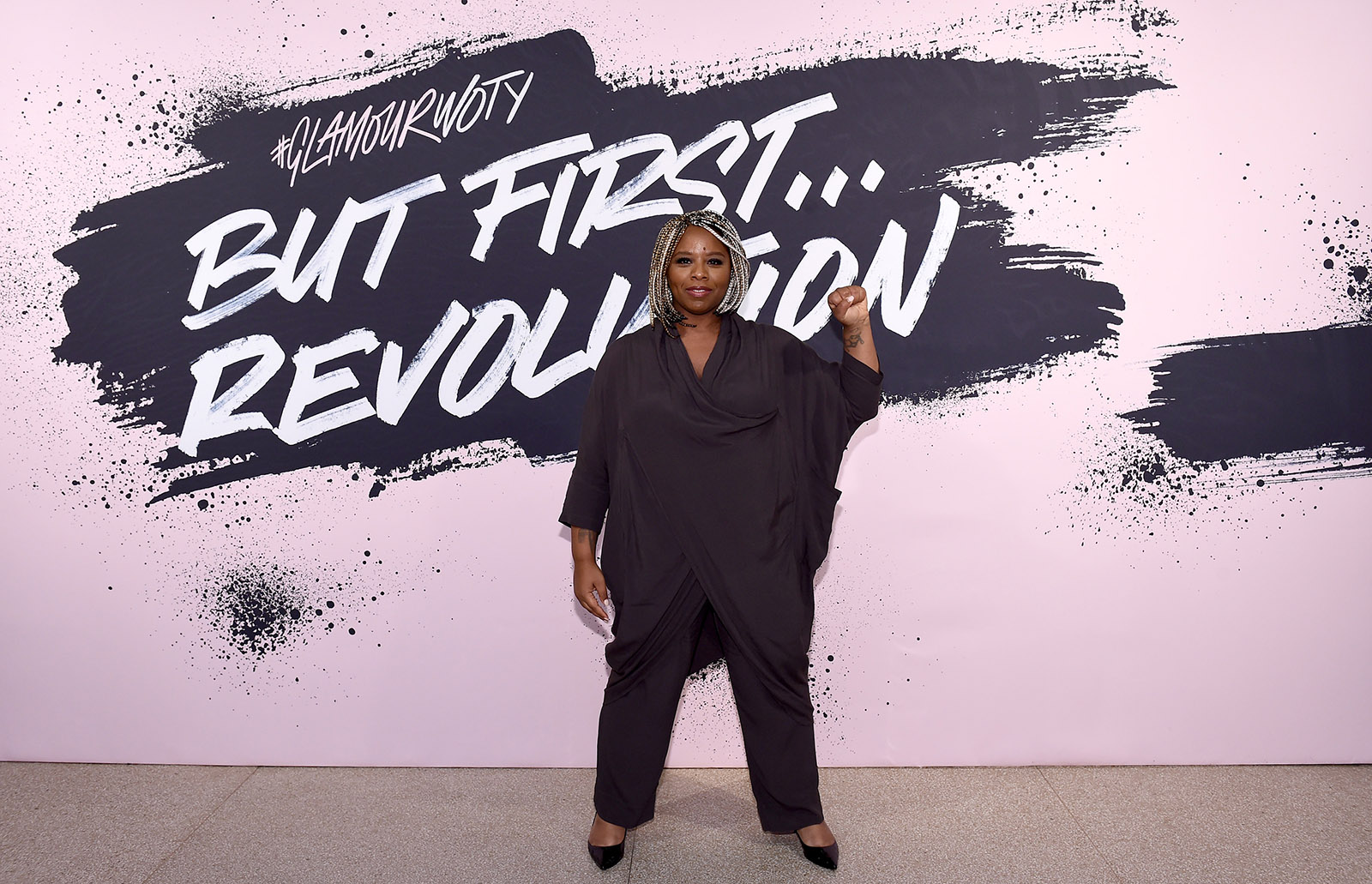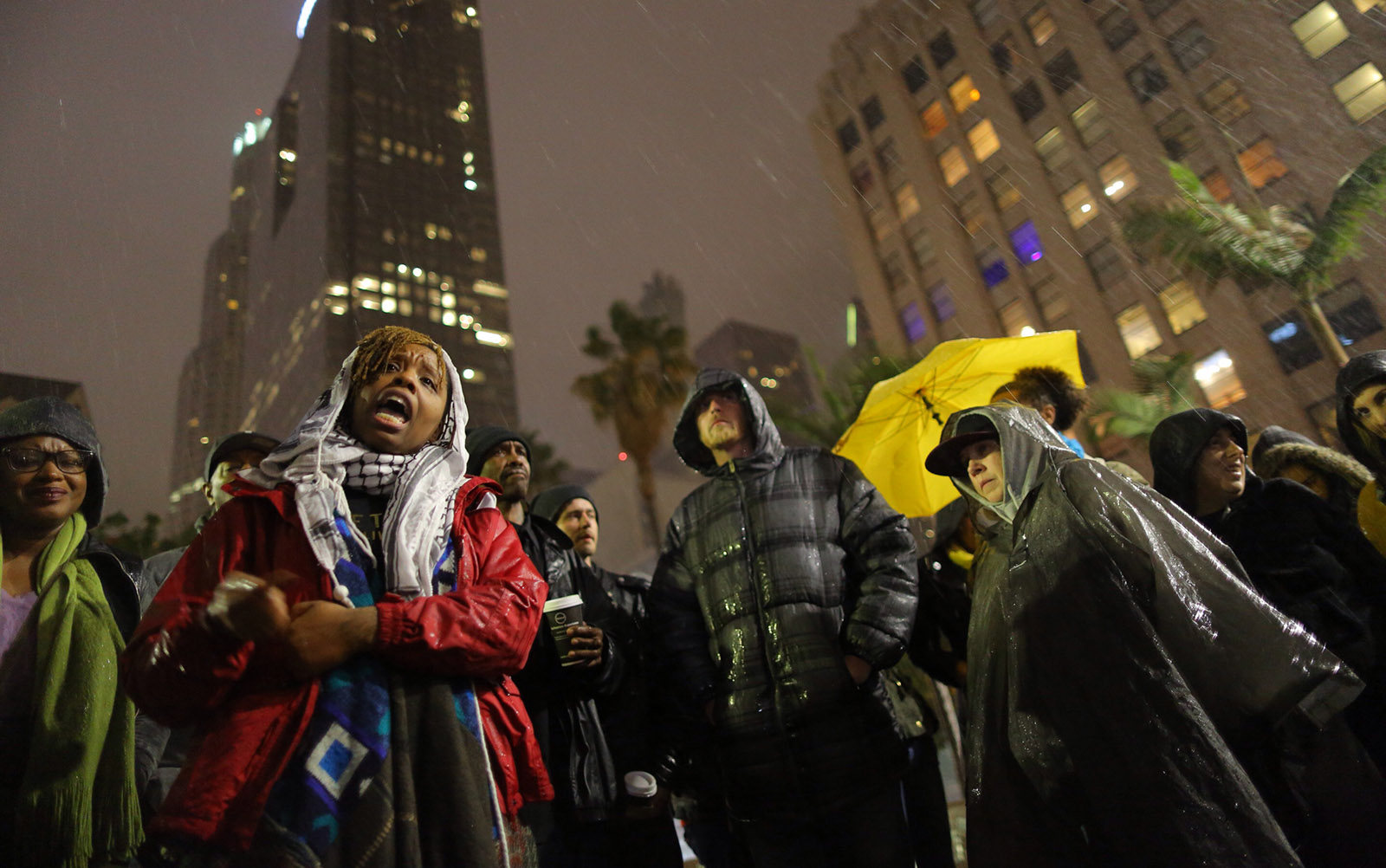At the age of sixteen, Patrisse Khan-Cullors came out to her family and moved from her home in San Fernando Valley, finding her voice as an advocate for poor, queer, black, and brown women. Khan-Cullors’s social activism began in the arts. In 2012, as a Fulbright scholar at UCLA, she showed her first piece, STAINED: An Intimate Portrait of State Violence, a multimedia performance based on her brother’s brutal treatment by police officers in Los Angeles County. STAINED was presented in intimate settings where only yellow police tape separated the audience from the performers who represented prisoners performing the day-to-day activities allowed, while Patrisse’s voice could be heard reading letters exchanged with her brother detailing the beatings he sustained while incarcerated.
Audiences were moved to action by the piece; they formed an alliance with Khan-Cullors to campaign for an end to mass incarceration and state-sanctioned violence in our prison systems. The result was the formation of two organizations, the Coalition to End Sheriff Violence, and Dignity and Power Now. Khan-Cullors became well-known in the Los Angeles area for her activism, but it wasn’t until the 2013 acquittal of George Zimmerman, who killed the unarmed seventeen-year-old Trayvon Martin, that the rest of the world became familiar with Khan-Cullors, her tenacity, and her commitment to eradicating racism.
What began as a hashtag soon led to a twenty-one-hour Black Lives Matter bus ride to Ferguson, Missouri, following the shooting of an unarmed Michael Brown by a police officer. The bus ride was organized by Khan-Cullors and Darnell L. Moore. As the hashtag evolved into a movement and the movement became more popular, there were attempts to co-opt its energy for profit and move it away from the central message intended by Khan-Cullors and her co-founders, Alicia Garza and Opal Tometi. But they succeeded in helping Black Lives Matter grow into an umbrella organization, with chapters across America and in other countries where black people faced victimization and marginalization. The goal was to build a member-led organization in which each chapter would “build local power and to intervene in violence inflicted on black communities by the state and vigilantes.”
Since the beginning of Black Lives Matter as a movement, Patrisse Khan-Cullors has faced many attempts to demean and belittle her accomplishments. Beyond monitoring the movement, the FBI went so far as to label the movement’s activists as “Black Identity Extremists,” according to an FBI Intelligence Report that contains eerie echoes of the agency’s discredited conduct during the COINTELPRO era. Whether the goal was to derail the movement specifically, to undermine the political advancement of people of color in general, or simply to mischaracterize the Black Lives Matter leadership, these efforts have proven futile. The movement remains strong and its founders continue to thrive.
So, what do we know about Patrisse Khan-Cullors aside from her role in the movement? Although she has toured the world to represent Black Lives Matter and address issues concerning racism and marginalized groups, little has been written about her life before activism. That is due to change with the release this week of her memoir, When They Call You a Terrorist, co-written with Asha Bandele. Last week, I corresponded with the woman who describes herself as a “wife of Harriet Tubman.” Our dialogue has been edited and condensed.
Aisha K. Staggers: At a symposium I attended in 2006, Julian Bond responded to a question about passing the baton of leadership by saying that “it would have to be pried from my cold, dead hands.” He changed his tune when Black Lives Matter gained recognition in Ferguson saying, “Snatch it, like we did.” Do you think those of the civil rights era are ready to support and embrace a movement like Black Lives Matter?
Patrisse Khan-Cullors: I think some civil rights leaders were ready to pass the baton. A lot of black women like Erica Huggins, of the Black Panther Party, or Angela Davis, embraced Black Lives Matter right from the start. It took a little longer for others, for lack of trust and not understanding what we were doing and how we were doing it. Once people understood we were here to stay and that this movement wasn’t going anywhere, we were able to get more and more civil rights leaders to embrace our leadership.
What most people know about BLM is that it started as a protest against police brutality. But while that issue remains a central concern, it’s obviously grown far beyond that. What would you say is the BLM agenda now, and how does it fit into the civil rights tradition?
What’s important about Black Lives Matter is that we are a part of a long tradition of black people fighting for freedom, both inside and outside this country. At the height of the civil rights movement, there was a Poor People’s Campaign—something the Southern Christian Leadership Conference (SCLC) was really pushing before Martin Luther King Jr. was assassinated—and that’s important. There’s a narrow version of the history of the civil rights movement that says that voting rights was the central issue, and if black people only had the right to vote, we would be free. What that understanding of history is missing is how the fight for black lives and the fight for freedom is a holistic fight that must have multi-pronged strategies—as, in fact, the civil rights movement did—in order to undo centuries of racism and to make it possible for black people to live and thrive in this country without the impending threat of death.
Advertisement
Initially, there was some pushback from black men, and attempts to co-opt the movement that you, Opal Tometi, and Alicia Garza began. That seemed to be because you wanted to equally represent both cis and trans black women, as well as gay men and lesbians who are also victims of anti-black discrimination, in the leadership. Why do you think that among ourselves we find it so difficult to see the black experience as being this inclusive?
Patriarchy and homophobia permeate society. I don’t think that black people are more homophobic, but I do think that in our communities the leadership for human rights and civil rights has been most visible through black men. There is a certain idea about who should be in power, and how they should be in power. What we’re seeing in this moment is that all black people—women, trans folk, queer folk—are on the front lines of this fight, and we’re going to be unapologetic about being there. Some people are afraid to see something new, or fear that these people who are the most marginalized should be in leadership of this movement.
In your book, you talk about how poverty affected you growing up and almost robbed you of your voice. Can you tell us how your journey into activism has helped change things for you personally?
Part of what happens growing up poor and black is that you are socialized to not believe in yourself and not believe in your abilities. As I grew up and was offered the gift of reading books by the likes of bell hooks, Audre Lorde, and Black Panther biographies, I evolved in my own politicization; I was learning so much about my own strength. I learned about what was possible for poor black people. I learned that I could be an organizer. I learned that I could be someone who was really invested in using her life to change the system and how we are in relationship to one another because of that system. Growing up poor and black is traumatic, and it erodes your self-worth. Movement work can remind us why we are worthy and why we are worth fighting for. That has been really powerful for me.
Black Lives Matter has been called a number of negative things in the media. It has become political capital for some to express criticism of the movement. What do you say to people who call BLM a “terrorist organization,” or blame the movement for the divisiveness we see in our society without seeing the issues that make such a movement necessary?
Over the last four and half years, we’ve seen Black Lives Matter go from a phrase to a hashtag to a political platform to a movement. In the development of Black Lives Matter, we’ve seen the growth of black leadership and the rise of white nationalism. We’ve seen the rise of white men who have really invested time and energy in trying to undermine our movement. Part of the work that we’ve done is to remind people across the globe that black people are critical to the fabric of American democracy. When we’ve been wrongfully called a terrorist organization, we have challenged that idea; we have insisted that our organization has never been anything but a peaceful organization. But this is not new: whenever black people come together to fight for our rights, we are often called terrorists. “Terrorist” is the new word for communist. It’s a sensational term, wrongfully applied.
In a couple of recent elections, in Virginia and in Alabama, the mobilization of black voters, especially black women voters, has proved crucial. And in upcoming elections, we are seeing a new bench of candidates, women especially, and black women taking up leadership roles more and more. How big a priority is electoral politics for BLM? Are political efforts to check voter ID laws and other forms of voter suppression particularly aimed at black voters (such as electoral roll purges) going to be a focus for BLM campaigning? What else is on the BLM agenda for 2018, and beyond?
Advertisement
How big a priority is electoral politics for Black Lives Matter? It’s less about elections as such, more about what the best strategy is for getting dignity and justice for black people. Sometimes, that looks like fighting for electoral justice, and sometimes, that looks like identifying what’s most necessary when it comes to fighting for our rights. In Alabama, we knew that if we won it, that could open up new avenues for the black community in Alabama.
So, the question is, what is the strategy needed to change the conditions for poor black people? Some of that can happen at the local level of government. For 2018, Black Lives Matter is taking a forward stance in challenging locally elected officials, but we are also looking back at what we have done over the last four years and building a strategy from that forward. The priority now is less about getting people to vote and more about building political power for black people through the movement. We could have a bunch of black people in office, as we saw with former President Obama, but that doesn’t mean that the poor black people, the most marginalized, are getting what they need.
When They Call You a Terrorist: A Black Lives Matter Memoir, by Patrisse Khan-Cullors and Asha Bandele, is published by Canongate.




